Mueller And The Reality Of Russian Election Interference
While much of the talk about Robert Mueller's testimony has focused on the Trump campaign, there was another part to his testimony that brings attention to a far more serious threat.
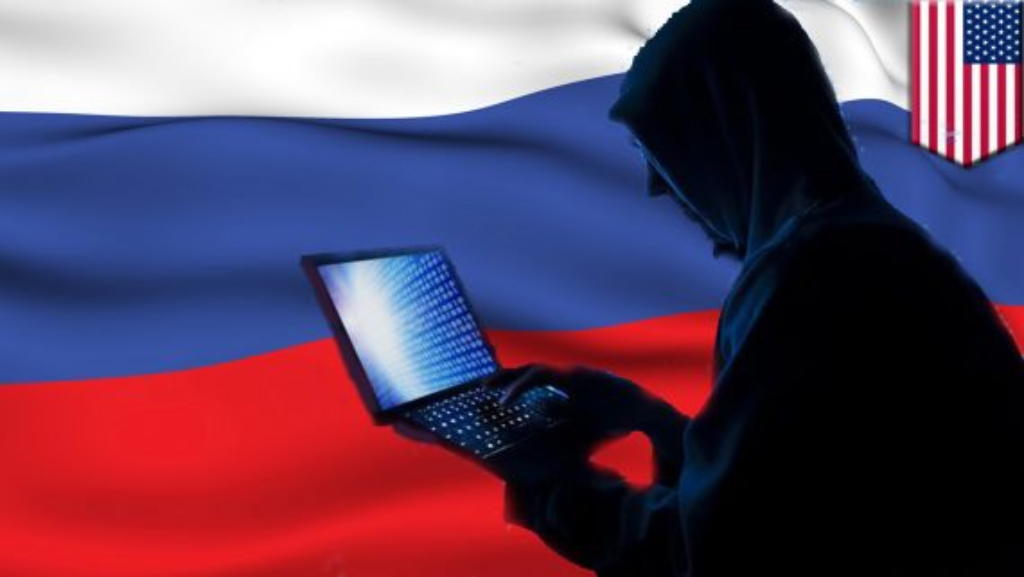
Most of the conversations that have taken place since Wednesday’s Congressional testimony by former Special Counsel Robert Mueller has concentrated on the optics of Mueller’s appearance, what he had to say about the twin issues of collusion and obstruction, and what that means for impeachment. However, that’s only half of what Mueller and his team was investigating. The other half had to do with the undeniable fact that, regardless of whether or not it was colluding with an American political campaign, Russia interfered in the 2016 election and that it has every intention of doing so again:
The biggest takeaway from Robert Mueller‘s appearances on Capitol Hill is not that Donald Trump may have obstructed justice, although that’s what most people continue to argue about.
It’s that Russians are still interfering in US elections.
“They’re doing it as we sit here,” Mueller told lawmakers of Russian interference. Earlier he’d said how that aspect of his investigation has been underplayed will have a long-term effect on the US
.In his report, the former special counsel disclosed that Russian hackers compromised local election systems of two Florida counties in 2016, a development later confirmed by Florida Gov. Ron DeSantis, although he said no votes were changed. And while Mueller did not bring conspiracy charges, it’s been well documented that Russians in 2016 were doing their best to help Trump, not Clinton, win.
Yet despite Mueller’s testimony, the special counsel report and alarming statements from elsewhere in Washington, public urgency on addressing Russian interference for the 2020 election appears lacking.On Wednesday, Mississippi Republican Sen. Cindy Hyde Smith blocked consideration of a trio of House-passed bills focused on election security.
Democrats plan to make election security a 2020 issue.
“Russians massively intervened in 2016 and they are prepared to do so again in voting that is set to begin a mere eight months from now,” said House Intelligence Committee chairman Adam Schiff, pointing out the one thing the Mueller report makes absolutely clear.
“(The) President seems to welcome the help again,” Schiff alleged, adding,
“And so we must make all efforts to harden our elections infrastructure, to ensure there is a paper trail for all voting, to deter the Russians from meddling, to discover it when they do, to disrupt it and make them pay.”
While the issues of collusion and obstruction took up the majority of the questioning by the Judiciary Committee on Wednesday, it was this issue that took up the roughly two hours that Mueller spent before the House Intelligence Committee. Many observers noted that Mueller seemed much more engaged for this second half of Wednesday’s proceedings but I think part of that was because the questions by the members of Intelligence Committee on both sides were far more focused on the issue at hand whereas the Judiciary Committee was far more partisan. The other reason, though, may have been because this issue, and the threat it poses to national security is one that Mueller may feel far more passionate about. This is, after all, the man who took over the F.B.I. in the wake of the September 11th attacks and who successfully guided it through a period when its focused shifted far more to counter-intelligence and counter-terror operations than it had been in the past.
The reality of what Mueller testified to before the Intelligence Committee was emphasized yesterday in the form of a report from the Senate Intelligence Committee regarding its own investigation of Russian interference, a report that is sobering to say the least:
WASHINGTON — The Senate Intelligence Committee concluded Thursday that election systems in all 50 states were targeted by Russia in 2016, an effort more far-reaching than previously acknowledged and one largely undetected by the states and federal officials at the time.
But while the bipartisan report’s warning that the United States remains vulnerable in the next election is clear, its findings were so heavily redacted at the insistence of American intelligence agencies that even some key recommendations for 2020 were blacked out.
The report — the first volume of several to be released from the committee’s investigation into Russia’s 2016 election interference — came 24 hours after the former special counsel Robert S. Mueller III warned that Russia was moving again to interfere “as we sit here.”
While details of many of the hackings directed by Russian intelligence, particularly in Illinois and Arizona, are well known, the committee described “an unprecedented level of activity against state election infrastructure” intended largely to search for vulnerabilities in the security of the election systems.
It concluded that while there was no evidence that any votes were changed in actual voting machines, “Russian cyberactors were in a position to delete or change voter data” in the Illinois voter database. The committee found no evidence that they did so.
In his testimony to two House committees on Wednesday, Mr. Mueller had sought to highlight the continued threat that Russia or other adversaries would seek to interfere in the 2020 elections. He said many more “countries are developing capability to replicate what the Russians have done.”
While the Senate Intelligence Committee’s findings were bipartisan, they came on a day when Senator Mitch McConnell, Republican of Kentucky and the majority leader, moved again to block consideration of election security legislation put forward by Democrats.
Mr. McConnell has long opposed giving the federal government a greater hand in an institution of American democracy typically run by the states.
And despite the warnings about the Russia threat, he argues that Congress has already done enough — passing $380 million worth of grants for states to update their election systems and supporting executive branch agencies as they make their own changes. Some administration officials have suggested that the issue is not getting enough high-level attention because President Trump equates any public discussion of malign Russian election activity with questions about the legitimacy of his victory.(…)
While the report is not directly critical of either American intelligence agencies or the states, it described what amounted to a cascading intelligence failure, in which the scope of the Russian effort was underestimated, warnings to the states were too muted, and state officials either underreacted or, in some cases, resisted federal efforts to offer help.
Even today, after a two-and-a-half-year investigation, the committee conceded that “Russian intentions regarding U.S. election infrastructure remain unclear.” Moscow’s intelligence agencies — chiefly the G.R.U., Russia’s main military intelligence unit — may have “intended to exploit vulnerabilities in the election infrastructure during the 2016 elections and, for unknown reasons, decided not to execute those options.”
But more ominously, the report suggested that it might have been cataloging options “for use at a later date” — a possibility that officials of the National Security Agency, the Department of Homeland Security and the F.B.I. said was their biggest worry.
The report also hinted at some intriguing new findings — but their effect was muted by the scope of the deletions demanded by intelligence agencies. For example, the report noted that the State Department was aware that Russian officials had requested to send election observers to polling places in the 2016 election — just as the United States often seeks to send observers to elections in foreign nations, including Russia.
That was of concern to the committee because testimony about election machines, which are disconnected from the internet, suggested the most efficient way to alter votes was with physical access to the machines or computers rather than programming them with ballots.
Given the potential for further incursions into the election system, the move by the intelligence agencies to redact large portions of the public version of the report touched off behind-the-scenes battles with members of the committee.
The deletions were so substantial that even the committee’s recommendations for the future were not spared: The section heading on the final recommendation read “Build a Credible,” but the remainder of the heading, and two paragraphs that follow, were blacked out.
The report, black lines and all, is titled, “Russian Efforts Against Election Infrastructure.” It is the first volume the committee has publicly released, after more than 200 witness interviews and the collection and review of nearly 400,000 documents. Subsequent volumes will deal with Russia’s effort to use social media to influence voters — an area where Russian interference may have changed minds, and thus votes — and the 200 or so contacts between Russia and members of the Trump campaign.
These findings and the facts to which Mueller testified to on Wednesday are hardly new, of course. It’s been clear for years now that Russia ran a campaign designed to interference in the 2016 interference. Indictments handed down by Mueller’s office in February and July of last year made clear that this interference came in two forms. First, there were remote attempts to conduct cyberattacks against both the election infrastructure systems of several states and also the computer systems of the Clinton campaign, Democratic National Committee, and other entities. The second part of the campaign, of course, involved the manipulation of social media in an effort to encourage the spread of false information regarding candidates and specific issues. Other reports have established efforts by Russia to interfere in the recent French elections, the recent “yellow vest” protests in France. the German elections, and the British Brexit vote, and the recent European Parliament elections. There have even been reports that Russian bots and trolls on social media have been involved in spreading anti-vaccination propaganda in the United States and elsewhere in the Western world. The fact that this has happened and that it will likely happen again has been established by the heads of all the major intelligence agencies, as well as by the Federal Bureau of Investigation and other law enforcement agencies.
As I noted yesterday, it is clear that this interference, which in 2020 could come from nations other than Russia such as Iran, North Korea, and China, is a clear threat to Ameican national security. The extent to which it could potentially undermine faith in the democratic system cannot, and the chaos that could create, should not be underestimated. That’s why the refusal of Mitch McConnell and at least some Senate Republicans to allow the Senate to vote on any election security measures is so maddening. The fact the interference was allowed to happen once was bad enough, to allow it to happen again is simply insane.
Here’s the report:
Senate Intelligence Committ… by Doug Mataconis on Scribd

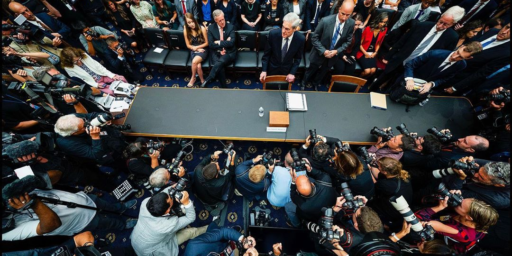
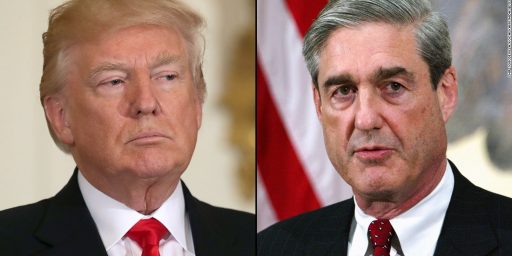
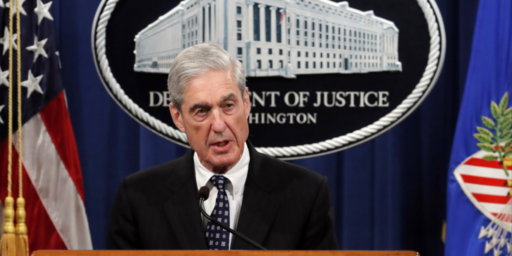

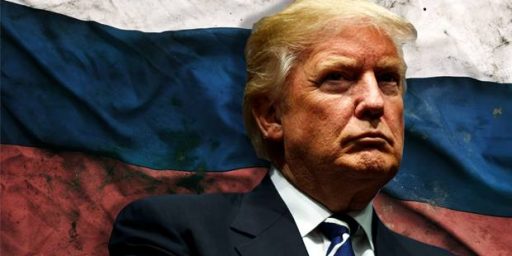
If I were running the GRU I might calculate that Trump has done most of the damage he can do and I’d go for a spectacular finish: I’d wait till the 2020 election was over and regardless of outcome, admit that it had been rigged. A huge blow against the very heart of Democracy, courtesy of #TraitorTrump, #MoscowMitch and #GOPGRU.
@michael reynolds: Even if it hadn’t been rigged, you would get a lot of mileage at that point by saying that you had rigged it. That’s how this game works – sow confusion and mistrust.
As noted in the other thread, the report speculates that the Russians might have been teeing up Trump-as-stooge to loudly question the integrity of the election and the legitimacy of President Hillary Clinton as a way to destabilize American politics. Instead, they hit the jackpot — that strategy will pay off much more handsomely when Trump is the incumbent, whether he wins or loses, if it’s obvious that there was tampering. That the tampering is obvious becomes a feature, not a bug.
I’ll eat my hat if there is a single republican voter out there who would rather lose a fair election than win one with the help of Putin. Complete scumbags every last one of them.
To be clear: they didn’t actually break anything or alter votes or anything. This was a probe of our defense and not a successful one. But this should be our concern going forward, not constantly relitigating the Russian interference of 2016, which mainly appears to have been Wikileaks, Twitter bots and Facebook ads. And this is one place where the GOP does have a small point: there is a danger in federalizing these things and created a universal vulnerability. I’d prefer an election security that gave states, localities and local election boards the resources to protect themselves. One of the reasons people pushed back on Trump’s claim that the election would be rigged is that everything is so decentralized, it would be almost impossible to rig it.
Note also: this gets a little easier if Barr and his ilk drop their opposition to encryption and stop insisting on “backdoors” into everything. A computer system can’t be a little bit vulnerable anymore than you can be a little bit pregnant. An unbreakable encryption standard would protect us all.
@Hal_10000:
I don’t think that’s a correct characterization. If the burglar walks around in your living room for an hour but leaves without taking anything, it’s not accurate to say that it was an “unsuccessful break-in”.
@DrDaveT:
If the burglar doesn’t take anything that you know about.
The burglar may have also left things. Or just licked every surface.
Rule if thumb with computer security: If your system lets someone in, you cannot be sure of what they did or did not do when they were in the system.
@Hal_10000:
Can you unpack this? From what I can tell, in Illinois at least, they had the ability to break things and chose not to — not uncommon when it comes to initial hacking attempts. And I’m not sure (until stuff in declassified years from now) if we actually know what happened in Georgia due to the server wipes (https://www.pbs.org/newshour/politics/georgia-election-server-wiped-after-suit-filed ).
To @DrDaveT’s point, unless I’m misreading the unredacted material, there were a number of cases where they broke in but opted not to take anything (i.e. change voter rolls).
it reminds me of the Clipper Chip nonsense from the 90s. or the people arguing that Apple should just break the encryption this one time to help out in this one terrorism case.
Hypothetically a slippery slope argument is a logical fallacy, but it is the case that some slopes are nearly vertical and hosed down with PB Blaster.
Bruce Schneier is an excellent resource on this topic, and he has lots of good essays and chapters and such explaining why serious unbreakable military-grade encryption is important for everyone’s security and safety in the big scheme of things.
Or done even more horrible things, if you’ve read Infinite Jest.
The country was attacked and the President* won’t even admit it happened, much less do anything about it. Is that not be sufficient grounds for impeachment?And conviction and removal from office? Assuming the majority of the Senate gave a damn about the country.
My take is that Mueller is an institutional person. His behavior has been shaped so that he will only say what the rules say that he can say.
He is mortified at stating implications publicly. He believes / behaves that a sitting President cannot be indicted per SC rulings.
Goes back to Taylor’s post on text.
It is the job of Congress to determine an impeachable act, and the DOJ just determines the facts.
What Mueller was saying when he said “The facts speak for themselves” is that it’s up to you morons to figure out what to do about what I’ve reported to you.
@michael reynolds: I would not. It’s clear that the GOP will trash America, destroying alliances and destabilizing the domestic system. Helping them to do it more will help Russia, and the amount of blackmail will only increase. It’s clear by now that even amoral prudence no longer binds the GOP.
Putin’s ‘red button’ will only grow stronger.
@Gustopher: @Gustopher: “The burglar may have also left things. Or just licked every surface.”
Retired the alarm system from the inside, opened the locks from the inside and altered them, planted bombs/documents/etc.,…